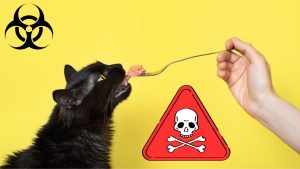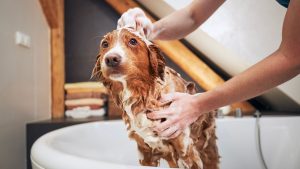Dog owners love to cuddle and play with their furry friends, but bad breath can be a deal-breaker. While some dogs have naturally bad breath, it can also be a sign of underlying health issues that require immediate attention. Understanding the causes of bad breath in dogs can help owners take better care of their pet’s oral hygiene and overall health.
Common causes of bad breath in dogs include poor oral hygiene, periodontal disease, and specific health issues. Poor oral hygiene can lead to the buildup of plaque and tartar, which can cause bad breath and eventually lead to periodontal disease. Certain health issues like kidney dysfunction, diabetes, and liver disease can also cause foul-smelling breath in dogs. It is essential to identify the underlying cause to determine the most effective treatment plan.
Key Takeaways
- Bad breath in dogs can be a sign of underlying health issues.
- Poor oral hygiene and periodontal disease are common causes of bad breath in dogs.
- Identifying the underlying cause of bad breath is crucial for effective treatment.
Understanding Dog’s Breath
Dog’s breath can be an indicator of their overall health. While it is normal for a dog’s breath to have a mild odor, excessively bad breath can be a sign of an underlying health issue. In this section, we will discuss the causes of dog’s breath, how to identify it, and what can be done to freshen it up.
Dogs’ breath can have a variety of odors, ranging from slightly sweet to sour, and sometimes even metallic. The most common cause of bad breath in dogs is poor dental hygiene. When food particles and bacteria accumulate in the mouth, it can lead to plaque buildup, gum disease, and tooth decay. Other causes of bad breath in dogs include:
- Kidney disease
- Diabetes
- Gastrointestinal disorders
- Respiratory infections
- Oral tumors
It is essential to identify the cause of your dog’s bad breath to determine the appropriate treatment. A visit to the vet is recommended to rule out any underlying medical conditions.
To help prevent bad breath in dogs, it is crucial to maintain good dental hygiene. Brushing your dog’s teeth regularly, feeding them a healthy diet, and providing them with dental chews can help keep their teeth and gums healthy. In addition, providing plenty of fresh water can help flush out any bacteria in the mouth.
If your dog’s breath is persistently bad, there are breath fresheners available specifically designed for dogs. However, it’s essential to choose a breath freshener that is safe for dogs and doesn’t contain any harmful ingredients.
In conclusion, understanding your dog’s breath is an essential aspect of their overall health. Identifying the cause of bad breath and taking appropriate measures to prevent it can help keep your furry friend happy and healthy.
Common Causes of Bad Breath in Dogs
Bad breath, also known as halitosis, is a common problem in dogs. There are several reasons why a dog’s breath may smell unpleasant. This section will discuss some of the most common causes of bad breath in dogs.
Dental Issues
Dental problems are the most common cause of bad breath in dogs. Just like humans, dogs can develop plaque and tartar buildup on their teeth, which can lead to gum disease, cavities, and other dental issues. When bacteria in the mouth break down food particles and other debris, they release foul-smelling gases that can cause bad breath.
Regular dental cleanings and good oral hygiene practices can help prevent dental problems and keep your dog’s breath fresh. Brushing your dog’s teeth regularly, feeding them dental chews or treats, and providing them with plenty of fresh water can all help promote good dental health.
Dietary Habits
What your dog eats can also affect their breath. Certain foods, such as garlic, onions, and fish, can cause bad breath in dogs. Additionally, if your dog eats a lot of table scraps or other human food, they may be more prone to bad breath.
To prevent bad breath caused by dietary habits, consider feeding your dog a high-quality dog food that is specifically formulated to promote good dental health. Avoid giving them table scraps or other human food, and be sure to provide them with plenty of fresh water to help rinse away food particles and bacteria.
Health Conditions
In some cases, bad breath in dogs can be a sign of an underlying health condition. For example, dogs with diabetes may have a sweet or fruity smell to their breath, while dogs with kidney disease may have a urine-like odor. Other health problems, such as infections or allergies, can also cause bad breath in dogs.
If your dog’s bad breath is persistent or accompanied by other symptoms, such as vomiting or lack of appetite, it’s important to take them to the vet for an evaluation. Your vet can help determine the underlying cause of the bad breath and recommend appropriate treatment.
Specific Health Issues Leading to Bad Breath
Diabetes
One of the possible reasons for bad breath in dogs is diabetes. When a dog has diabetes, their body is unable to produce enough insulin to regulate their blood sugar levels. As a result, their body starts to break down fat for energy, producing ketones. These ketones have a sweet smell, which can cause bad breath in dogs. In addition to bad breath, other symptoms of diabetes in dogs include increased thirst, frequent urination, and weight loss.
Liver Disease
Another possible cause of bad breath in dogs is liver disease. When a dog’s liver is not functioning properly, toxins build up in their body, leading to bad breath. Additionally, dogs with liver disease may have a lack of appetite, weight loss, and other health conditions. If a dog’s breath smells sweet, it may be a sign of liver disease.
Kidney Disease
Kidney disease is another possible cause of bad breath in dogs. When a dog’s kidneys are not functioning properly, they may produce a high level of urea, which can cause bad breath. Additionally, dogs with kidney disease may have a lack of appetite, weight loss, and other health conditions. If a dog’s breath smells like ammonia, it may be a sign of kidney disease or kidney failure.
In conclusion, bad breath in dogs can be caused by various health issues, including diabetes, liver disease, and kidney disease. If a dog has bad breath, it is important to take them to a veterinarian for a check-up to determine the underlying cause of the problem.
Oral Hygiene for Dogs
Maintaining good oral hygiene is essential to keep your dog’s breath smelling fresh and prevent dental problems. Here are some ways to keep your dog’s teeth and gums healthy:
Brushing
Regular brushing is the most effective way to keep your dog’s teeth clean and prevent bad breath. Use a toothbrush and toothpaste specifically designed for dogs. Human toothpaste can be harmful to dogs as it contains fluoride, which can be toxic to them. Brushing should be done at least twice a week, but ideally, it should be done daily.
Dental Treats
Dental treats are another way to help keep your dog’s teeth clean. They work by mechanically scrubbing the teeth and removing plaque and tartar. Look for dental treats that are low in calories and contain ingredients that are beneficial for dental health, such as enzymes that break down plaque.
Chew Toys
Chew toys can also help keep your dog’s teeth clean by scraping away plaque and tartar. Look for toys that are specifically designed for dental health, such as those made from rubber or nylon. Avoid hard toys that can break teeth or cause other injuries.
Professional Cleaning
Regular visits to the veterinarian for professional cleaning are essential to maintain good oral health. A professional cleaning involves scaling the teeth to remove plaque and tartar and polishing them to make them smooth. This procedure is done under anesthesia, so it is essential to follow your veterinarian’s instructions before and after the procedure.
In addition to these methods, there are also some home remedies that can help keep your dog’s breath smelling fresh. For example, adding a small amount of parsley to your dog’s food can help neutralize bad breath. However, it is important to note that home remedies should not be used as a substitute for proper dental care.
Overall, maintaining good oral hygiene is essential to keep your dog’s breath smelling fresh and prevent dental problems. By regularly brushing your dog’s teeth, providing dental treats and chew toys, and scheduling regular professional cleanings, you can help ensure that your dog’s teeth and gums stay healthy.
When to Consult a Veterinarian
If a dog’s bad breath persists despite regular dental hygiene and dietary changes, it may be time to consult a veterinarian. Inflammation or infection in the mouth can lead to bad breath, and a veterinarian can diagnose and treat these conditions.
In addition, if a dog is showing other symptoms such as vomiting or a loss of appetite, it may be a sign of a more serious condition such as tumors or masses in the mouth or throat. Melanoma and squamous cell carcinoma are two types of cancer that can occur in the mouth of dogs, and early detection is key for successful treatment.
Skin infections and tooth loss can also contribute to bad breath in dogs. A veterinarian can examine the dog’s mouth and teeth to determine if these conditions are present and recommend appropriate treatment.
Overall, if a dog’s bad breath is persistent or accompanied by other symptoms, it is important to consult a veterinarian for proper diagnosis and treatment.
Preventing Bad Breath in Dogs
Preventing bad breath in dogs is important not only for their dental health but also for their overall well-being. Here are some tips to help keep your furry friend’s breath smelling fresh:
1. Diet and Treats
What your dog eats can have a significant impact on their breath. Feeding your dog a high-quality diet that is rich in nutrients can help maintain their oral health. Avoid giving them table scraps or unhealthy treats that can cause bad breath. Instead, opt for dental chews or treats that help clean their teeth.
2. Eating Habits
Encourage your dog to eat slowly and chew their food thoroughly. This can help reduce the buildup of bacteria in their mouth, which can cause bad breath. Avoid feeding them immediately before or after exercise as this can also contribute to bad breath.
3. Microbiome
The microbiome in your dog’s mouth plays a crucial role in their oral health. Regular brushing and the use of canine toothpaste can help maintain a healthy balance of bacteria in their mouth. Additionally, probiotics can help support a healthy microbiome and reduce bad breath.
4. Bath and Grooming
Regular grooming and bathing can help reduce the buildup of bacteria on your dog’s coat and skin, which can contribute to bad breath. Be sure to dry your dog thoroughly after bathing to prevent moisture buildup in their mouth.
5. Bones and Chews
Giving your dog bones and chews can help clean their teeth and reduce bad breath. However, it’s important to choose safe options that won’t splinter or cause digestive issues.
6. Coprophagia
Dogs that eat their own feces can develop bad breath. To prevent this, discourage this behavior and keep their living area clean.
7. Vitamins and Supplements
Certain vitamins and supplements can help support your dog’s oral health and reduce bad breath. Talk to your veterinarian about which options may be best for your dog.
8. Health Conditions
Bad breath can also be a sign of underlying health conditions such as dental disease, gastrointestinal issues, or kidney disease. Regular check-ups with your veterinarian can help identify and treat these conditions early on.
Frequently Asked Questions
What are some home remedies for bad breath in dogs?
There are a few home remedies that can help freshen your dog’s breath. Brushing your dog’s teeth regularly with dog-specific toothpaste can help prevent plaque buildup. You can also give your dog dental chews, bones, or toys that are designed to help clean their teeth. Adding parsley, mint, or cinnamon to your dog’s food can also help freshen their breath.
Is bad breath in dogs always a sign of illness?
Not always. Bad breath can be caused by poor dental hygiene, but it can also be a sign of an underlying health issue. If your dog’s bad breath is accompanied by other symptoms such as vomiting, diarrhea, or lethargy, it may be a sign of an underlying health problem.
How can excessive licking cause bad breath in dogs?
Excessive licking can cause bad breath in dogs because it can lead to a buildup of bacteria in the mouth. When dogs lick themselves excessively, they can transfer bacteria from their skin to their mouth, which can then cause bad breath.
What can I do to fix my dog’s fishy breath?
Fishy breath in dogs can be caused by a variety of factors, including dental issues, kidney disease, or liver disease. It’s important to take your dog to the vet to determine the underlying cause of their fishy breath. Treatment will depend on the cause of the bad breath.
Why does my dog suddenly have bad breath?
Sudden bad breath in dogs can be caused by a variety of factors, including dental issues, diet changes, or underlying health problems. If your dog suddenly develops bad breath, it’s important to take them to the vet to determine the underlying cause.
Can bad breath in dogs be caused by stomach problems?
Yes, bad breath in dogs can be caused by stomach problems such as acid reflux or gastrointestinal issues. If your dog’s bad breath is accompanied by vomiting or diarrhea, it’s important to take them to the vet to determine the underlying cause.
There are a few home remedies that can help freshen your dog’s breath. Brushing your dog’s teeth regularly with dog-specific toothpaste can help prevent plaque buildup. You can also give your dog dental chews, bones, or toys that are designed to help clean their teeth. Adding parsley, mint, or cinnamon to your dog’s food can also help freshen their breath.
“}},{“@type”:”Question”,”name”:”Is bad breath in dogs always a sign of illness?”,”acceptedAnswer”:{“@type”:”Answer”,”text”:”
Not always. Bad breath can be caused by poor dental hygiene, but it can also be a sign of an underlying health issue. If your dog’s bad breath is accompanied by other symptoms such as vomiting, diarrhea, or lethargy, it may be a sign of an underlying health problem.
“}},{“@type”:”Question”,”name”:”How can excessive licking cause bad breath in dogs?”,”acceptedAnswer”:{“@type”:”Answer”,”text”:”
Excessive licking can cause bad breath in dogs because it can lead to a buildup of bacteria in the mouth. When dogs lick themselves excessively, they can transfer bacteria from their skin to their mouth, which can then cause bad breath.
“}},{“@type”:”Question”,”name”:”What can I do to fix my dog’s fishy breath?”,”acceptedAnswer”:{“@type”:”Answer”,”text”:”
Fishy breath in dogs can be caused by a variety of factors, including dental issues, kidney disease, or liver disease. It’s important to take your dog to the vet to determine the underlying cause of their fishy breath. Treatment will depend on the cause of the bad breath.
“}},{“@type”:”Question”,”name”:”Why does my dog suddenly have bad breath?”,”acceptedAnswer”:{“@type”:”Answer”,”text”:”
Sudden bad breath in dogs can be caused by a variety of factors, including dental issues, diet changes, or underlying health problems. If your dog suddenly develops bad breath, it’s important to take them to the vet to determine the underlying cause.
“}},{“@type”:”Question”,”name”:”Can bad breath in dogs be caused by stomach problems?”,”acceptedAnswer”:{“@type”:”Answer”,”text”:”
Yes, bad breath in dogs can be caused by stomach problems such as acid reflux or gastrointestinal issues. If your dog’s bad breath is accompanied by vomiting or diarrhea, it’s important to take them to the vet to determine the underlying cause.
“}}]}
Author
-

Lawrence, the founder of Pet Ploy, established the website in mid-2023. With a lifelong love for pets, Lawrence has been surrounded by a variety of animals since his early years. From dogs and cats to guinea pigs, rabbits, fish, and more, he has experienced the joy of caring for a diverse range of pets. Drawing from his deep-rooted passion, Lawrence created Pet Ploy to share his knowledge and enthusiasm with fellow pet enthusiasts. Through the platform, he aims to provide valuable insights, tips, and resources to promote the well-being and happiness of pets everywhere.












One Response